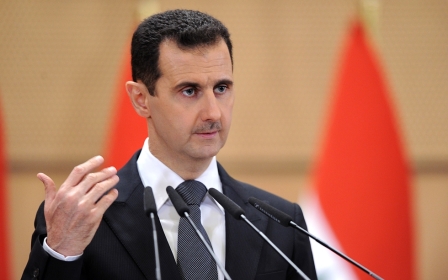Damascus area flares with clashes, threatening Syrian truce

Heavy fighting gripped a flashpoint region near Syria's capital on Sunday, leaving nine civilians dead and threatening a nationwide truce designed to pave the way towards peace talks.
Further east, Syrian government troops lost ground to the Islamic State (IS) group near the key Deir Ezzor military airport. The escalating violence augurs ill for peace negotiations in Kazakhstan later this month.
In the Wadi Barada region northwest of Damascus, fresh clashes broke out between rebel groups and advancing government forces, the Syrian Observatory for Human Rights said, threatening to disrupt planned repairs to a pumping station that supplies most of the capital's water, a war monitor said.
The Syrian Observatory for Human Rights said the army and the allied Lebanese militia Hezbollah had made some gains against rebels in the Wadi Barada area. Heavy fighting reached the outskirts of the Ain al-Fija town, where the waterworks is located, the British-based war monitor reported.
Artillery shelling by government forces killed nine people and wounded at least 20 others in the nearby Deir Qanun village, it said. A local media office for opposition activists said the shelling hit a centre for displaced people.
Observatory head Rami Abdel Rahman said it was the "highest toll" there since the truce came into force on 30 December.
Wadi Barada, a mountainous valley northwest of Damascus, has become a major battlefront in the Syrian war, and damage to the facility has caused severe water shortages in the capital since the beginning of the year.
The governor of the Damascus countryside province said on Friday that engineers had entered Ain al-Fija to repair the water station, as part of a wider agreement that included the departure of some rebels from Wadi Barada and a settlement with others who would remain there.
But the plan was derailed on Saturday evening when armed men killed the head of a negotiation team who was overseeing the agreement and repairs, the Observatory said. The warring sides accused each other of assassinating the official, who had only assumed his role a day before.
A military media unit run by Hezbollah said the army captured some positions overlooking Ain al-Fija on Saturday, after taking nearby villages in recent days and edging closer towards the water facility.
The water station was knocked out of service in late December. The UN has said it was damaged because "infrastructure was deliberately targeted," without saying who was responsible.
This left four million people in Damascus without safe drinking water supplies.
Rebels and activists have said government bombardment damaged the waterworks. The government said rebel groups polluted it with diesel, forcing the state to cut supplies.
Wadi Barada has become the main focus of fighting between forces loyal to President Bashar al-Assad, backed by Russia and Iran, and rebel groups seeking to oust him, after the government took full control of Aleppo city last month.
Omar al-Shami, spokesman for the Wadi Barada Media Committee, gave a toll of 12 killed and said shells struck a temporary shelter where displaced women and children had been seeking refuge.
The activist group published gruesome pictures of what it said was the aftermath of the attack, including photographs of blood-stained floors and body parts wrapped in blankets.
An official from the reconciliation ministry earlier said the local deal in Wadi Barada "had not completely collapsed".
"We are communicating and pursuing new efforts in parallel with the ongoing military action," the official said.
Many battlefronts have quieted since the nationwide ceasefire brokered by Syrian government backer Russia and opposition ally Turkey.
The deal excludes IS and its militant rival, the Fateh al-Sham Front - formerly the al-Qaeda-linked al-Nusra Front.
On Sunday, IS militants edged closer to Deir Ezzor military airport, in spite of heavy air strikes by government warplanes.
The Observatory said Sunday raids in Deir Ezzor killed five civilians, including two women and two children.
It was the second day of the militant group's brutal assault on government-held territory around the city.
It came amid more than 120 government air strikes as well as heavy artillery fire, said Abdel Rahman.
A military source told AFP that Russian warplanes had carried out "a series of air strikes" around the airport and on several nearby hilltops.
IS unleashed a wave of tunnel bombs and suicide attacks against government forces on Saturday, leaving 12 government fighters dead.
Another 20 IS militants were killed in clashes.
The group has lost swathes of territory in northern Syria to Kurdish fighters as well as to a Turkish-backed rebel alliance, but it remains on the offensive in other parts of the country.
Middle East Eye propose une couverture et une analyse indépendantes et incomparables du Moyen-Orient, de l’Afrique du Nord et d’autres régions du monde. Pour en savoir plus sur la reprise de ce contenu et les frais qui s’appliquent, veuillez remplir ce formulaire [en anglais]. Pour en savoir plus sur MEE, cliquez ici [en anglais].





